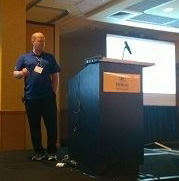In a paper presented by UW CSE Ph.D. alum Andrew Putnam at this week’s International Symposium on Computer Architecture, Microsoft researchers described the use of field-programmable gate arrays (FPGAs) to deliver performance improvements of as much as 95 percent on Bing search. It’s incredibly cool and high-impact work!
The paper, “A Reconfigurable Fabric for Accelerating Large-Scale Datacenter Services,” had 23 authors(!). In addition to Andrew, the principal technical contributors to the work were Doug Burger (Director of Client & Could Apps at Microsoft Research, and a UW CSE adjunct professor), Adrian Caulfield (MSR, and a UW CSE bachelors alum who received his Ph.D. at UCSD from UW CSE Ph.D. alum Steve Swanson), Derek Chiou (University of Texas faculty member), and Eric Chung (MSR).
Quoting from the abstract: “Datacenter workloads demand high computational capabilities, flexibility, power efficiency, and low cost… To advance datacenter capabilities beyond what commodity server designs can provide, we have designed and built a composable, reconfigurable fabric to accelerate portions of large-scale software services. Each instantiation of the fabric consists of a 6×8 2-D torus of high-end Stratix V FPGAs embedded into a half-rack of 48 machines… In this paper, we describe a medium-scale deployment of this fabric on a bed of 1,632 servers, and measure its efficacy in accelerating the Bing web search engine… Under high load, the large-scale reconfigurable fabric improves the ranking throughput of each server by a factor of 95% for a fixed latency distribution – or, while maintaining equivalent throughput, reduces the tail latency by 29%.”
Read the paper here. Read a Wired article here. Read a Microsoft press release here.


